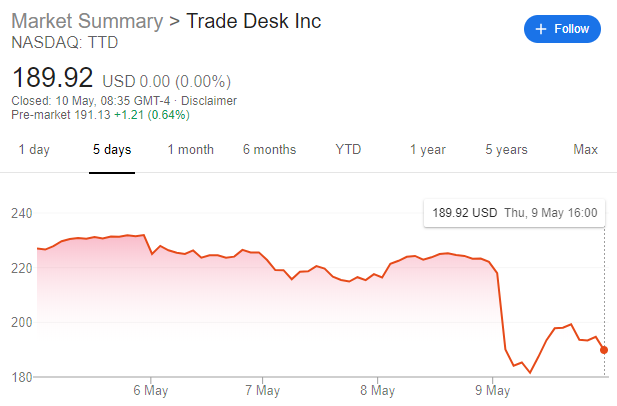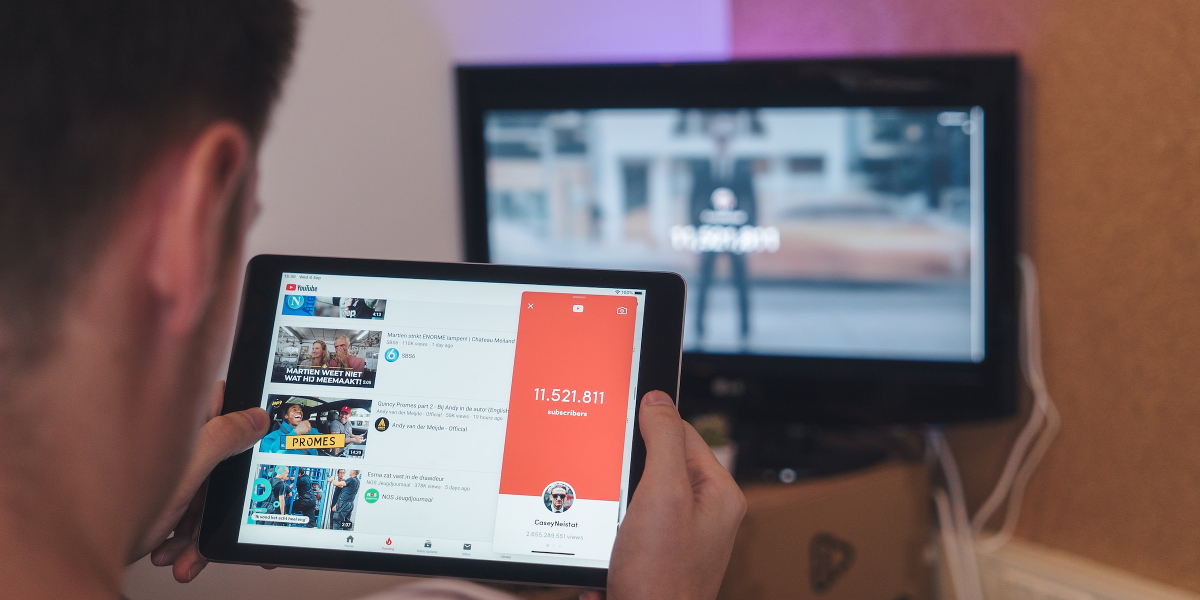In this week’s Week in Review: Roku posts strong Q1 results, ITV reports falling ad revenues, and Facebook updates its algorithm for ranking video content. To receive an update on the industry’s top stories every Friday, sign up to the weekly Video Round-Up.
Top Stories
Roku’s Video Ad Impressions More Than Double in One Year
Roku’s share price is up by 28 percent since it announced its Q1 financial results this week, in which the company reported rapidly growing ad revenues and strong distribution growth for its Roku software. Total net revenue was up 51 percent year-on-year, with platform revenue (which included ad revenues, as well as distribution revenues shares and audience development revenue) up 71 percent. Q1 monetised video ad impressions across the platforms more than doubled year-on-year, according to the results.
Roku also now claims its smart TV operating software is now the best selling in the US. As well as selling dedicated Roku boxes and sticks, the company licenses its software to smart TV manufacturers, and it estimated that in Q1 more than a third of smart TVs sold in the US were Roku TVs.
ITV’s Ad Revenues Fall Amid Political and Economic Uncertainty
British broadcaster ITV reported a difficult Q1 in which total ad revenues fell by seven percent year-on-year, and total external revenues were down four percent. The company blamed this performance in part on economic and political uncertainty, as well as the timing of Easter (which was unusually late, meaning Easter ad campaigns mostly didn’t begin running until after Q1). It’s woes are expected to continue into Q2, since last year’s ad revenues were boosted by the FIFA World Cup, and the political and economic uncertainty is expected to continue.
There were positive signs too – the ITV Family’s share of viewing was up four percent, and online viewing was up 16 percent. And CEO Carolyn McCall believes the launch of streaming service BritBox later this yuear, as well as the launch of programmatically traded addressable advertising on ITV Hub via ITV’s Amobee partnership, will aid the turnaround. But some are worried by ITV’s continued disappointing results. Analyst Liberum downgraded its rating for ITV from ‘buy’ to ‘hold’, saying that it doesn’t see “a material improvement in conditions any time soon”.
Facebook Updates its Video Ranking Algorithm
Facebook this week announced it is making changes to the way its algorithm picks which video content to show to its users first, a move which the social network says is designed to benefit those creating original content. Facebook will further prioritise videos which perform well on three metrics:
- Loyalty and intent: Videos which users specifically seek out and return to regularly will be given higher rankings
- Video and viewing duration: Videos which keep users engaged for longer will be given higher rankings, especially those which are over three minutes long
- Originality: Facebook will more strongly limit distribution and monetisation for unoriginal or re-purposed content from other sources with limited added value, and will further demote video content from Pages involved in sharing schemes.
These changes will impact video distribution across Facebook, including on the News Feed, on Facebook Watch, and in Facebook’s ‘More Videos’ recommendations.
The Week in Tech
Google Tightens Controls Over Cookie-Based Tracking on Chrome
Google today officially unveiled new privacy updates to its Chrome browser, revealing that it’s releasing new controls for monitoring and blocking online tracking, and increasing its own ability to see when cookies are being used by third-parties to track users across the web. The announcement, made at the tech giant’s Google I/O developer conference, confirms rumours which have circulated over the past month that Google would follow in the footsteps of Apple and Mozilla in restricting the ability of third parties to track users across the internet. Read the full story on VAN.
The Trade Desk Posts Strong Q1 Results, but Shares Slide Regardless
The Trade Desk posted yet another set of strong results in its Q1 trading update this week, but the company’s share price fell by 18 percent after the results were announced as markets were spooked that the company’s impressive growth may be slowing down.
The company’s Q1 revenues hit $121 million, above expectations of around $117 million, and representing 41 percent year-on-year growth. “In Q1, we continued to develop closer relationships with the biggest brands in the world,” said The Trade Desk CEO Jeff Green. “Over half of the companies in the S&P 500 have run campaigns on our platform. We are executing well.” However, while the company raised its full year guidance, its guidance for Q2 revenues of $154 million were in line with analyst’s expectations. Given that Q1 revenues came in above market estimates, investors were seemingly concerned by the fact that Q2 guidance wasn’t also proportionately higher. At the time of writing, The Trade Desk’s share price had rallied slightly, but was still 14 percent lower than when the results were announced.
Rubicon Project Launches ‘Demand Manager’ for Prebid-Based Header Bidding
Rubicon Project this week announced the private beta release of Demand Manager, a tool which it says helps publishers deploy, configure and optimise their own prebid-based header bidding solutions. The solution is designed to save publishers time and effort in setting up and adjusting their prebid-based header bidding solutions. “As Prebid scaled globally, it became clear that publishers had to expend significant time and resources adapting it to their needs, which is unsustainable and unnecessary,” said Tom Kershaw, CTO at Rubicon Project. “With Demand Manager, we see the opportunity to combine the transparency and flexibility of open source with a turnkey service that puts control back in the publishers’ hands so they don’t have to rely on us or anyone else to run their businesses.”
Alphonso and PlaceIQ Partner for Location Data in TV Measurement
TV data company Alphonso and location data specialist PlaceIQ have launched a new partnership to layer the latter’s location data in with TV advertising measurement. Alphonso will on-board PlaceIQ’s data into a self-serve dashboard which buyers can they use for attribution, according to AdExchanger. Alphonso’s smart TV tech will measure when and where ad creative is running, while PlaceIQ will map in-store visits with its location data, with Alphonso’s device graph also linking smart TVs with active devices within the same household. All this will be combined to suggest when an ad has led to an in-store visit.
The Week in TV
Discovery and ProSiebenSat.1’s Streaming Service ‘Joyn’ to Launch in June
ProSiebenSat.1 and Discovery have announced that their joint streaming service, designed to be the German equivalent of Hulu, will be called ‘Joyn’ and will launch in June this year. The service will start off entirely ad-funded, with subscription options to be launched later in the year. The two founders have aimed to sign up as many German broadcasters as possible, with ZDF, Axel Springer and Sport1 among those partnering for content – but RTL a significant omission. This means that at launch, Joyn will offer access to 50 live channels, with content also available on-demand.
ProSiebenSat.1 CEO Max Conze hopes to expand the service’s library over time with more content partnerships, and hopes to pull ten million users onto the service within its first two years.
NBCUniversal Debuts Shoppable Ads for Linear TV
NBCUniversal has been testing a new form of shoppable ads for linear TV, using QR codes displayed within the ads to lead users via their phones to e-commerce sites. The broadcaster trialled the format during a ‘Today’ broadcast, and says 50,000 people navigated to the online shop via the QR code. “This is another step in transcending the legacy business practices of TV,” Josh Feldman, EVP, head of marketing and ad creative at NBCU told AdExchanger. “We are moving fully away from GRP selling to providing business outcomes.”
Sinclair Buys $10.6 Billion-Valued Regional Sports Networks from Disney
Sinclair Broadcast Group has bought 21 Regional Sports Networks, as well as Fox Colleges Sports, from Disney, valuing the properties at $10.6 billion. Disney acquired the RSNs when it bought the majority of Fox’s assets last year, but was required by regulators to divest them due to Disney’s ownership of US sports media giant ESPN. The RSNs hold the exclusive local rights to 42 major sports teams’ games – 14 MLB teams, 16 NBA times and 12 NHL teams.
Liberty Global Suffers Pay TV Losses in Q1
Multinational telco Liberty Global reported mixed Q1 results in which rebased revenue for its continued operations was down 0.6 percent year-on-year to $2.87 billion, as the company prepares to offload substantial parts of its business. The discontinued section of its business (the operations in Germany, Hungary, Romania and the Czech Republic which Liberty has agreed to sell to Vodafone), had an even tougher quarter, with rebased revenues down 2.6 percent. Read the full story on VAN.
The Week in Publishing
Vice Raises $250 Million in Debt, while Disney Writes Down its Investment by $353 Million
Vice Media has raised $250 million in debt as it seeks to fund its turnaround strategy, with 23 Capital, Soros Fund Management, Fortress Investment Group and Monroe Capital among those contributing. Vice said in a statement that the money would be used to accelerate growth, allowing the company to “execute [its] new leadership’s strategic vision for the company”. But while this was something of a show of confidence in the digital media company, there was bad news elsewhere as Disney marked down its investment in the company by $353 million. This is the second time in less than a year that Disney has marked down its investment, following a $157 million write down in 2018.
Amazon Considers Paying US Publishers to Expand Abroad
Amazon is in talks with US publishers including the New York Times and Buzzfeed about giving them money up front to help them expand internationally, according to Recode. Amazon reportedly believes that if it helps these publishers expand their international presences, they could drive more customers to Amazon through affiliate links, and to help speed up this process the e-commerce giant is willing to pay the money up front.
NYT Profits Rise Thirty-Eight Percent
The New York Times posted positive Q1 financial results this week, with net income up 38 percent year-on-year to $30.2 million. The results were fuelled by continued growth in subscription revenues, with 223,000 new subscribers joining in Q1, though this marks a slowdown in subscriber count growth from the previous quarter of 16 percent. Meanwhile overall ad revenues were roughly flat at $125 million, though digital ad revenues were up 19 percent to $55.5 million.
The Week for Agencies
Forsman & Bodenfors Launches ‘Grow Your Circle’ to Tackle Diversity Issues
MDC Partners-owned agency Forsman & Bodenfors New York has fully launched ‘Grow Your Circle‘, a platform designed to help connect advertising agencies with underrepresented talent from disciplines across all types of production. Underrepresented talent in this case refers to racial and ethnic backgrounds, genders and identities that are disproportionately represented in advertising production.
US Digital Ad Spend Passes $100 Billion
Digital ad spend in the US passed $100 billion in 2018, reaching $107.5 billion, according to the IAB’s annual Internet Advertising Revenue Report. This marks 21.8 percent growth year-on-year from 2017, when spending reached $88 million. The report says that mobile and video continue to lead digital marketing’s growth, with video ad revenues up 37 percent from $16.3 billion in 2018 to $11.9 billion in 2017.
Johnson & Johnson Cuts Marketing Budget, Causing Problems for Omnicom and WPP
Johnson & Johnson has significantly cut back its marketing spend, causing problems for Omnicom and WPP which had both relatively recently created dedicated units to cater to the brand, according to an Adweek report. The amount of money Johnson & Johnson is spending with the two units has roughly halved over the past year according to the report, resulting in a number of layoffs.
Hires of the Week
OpenAP Hires David Levy as First CEO
US TV consortium OpenAP has hired David Levy as its first CEO. Levy previously worked as EVP of non-linear ad revenue at Fox Networks Group, and has served as chairman of OpenAP’s board since September last year.
Philippa Brown Picked as CEO for PHD Worldwide
Philippa Brown has been picked as global CEO of PHD Worldwide, moving from her current position as CEO of Omnicom Media Group UK. Brown replaces Mike Cooper, and will be the first woman to hold a global chief executive role within OMG, according to Adweek.
 ID5 Appoints Joanna Burton as Chief Strategy Officer
ID5 Appoints Joanna Burton as Chief Strategy Officer
ID5 this week reported that is has hired Joanna Burton as its new chief strategy officer. Burton, previously VP of European Strategy at SpotX, will create a go-to-market strategy to drive revenue, strengthen partnerships with premium publishers, and accelerate the company’s international expansion, according to the press release.
This Week on VAN
Liberty Global Suffers Pay TV Losses in Q1, read more on VAN
Google Tightens Controls Over Cookie-Based Tracking on Chrome, read more on VAN
The Buy-Side View: Q&A with Montblanc’s Maria Gräfin von Scheel-Plessen, read more on VAN
Ad of the Week
Škoda France, Hesitation is No Longer an Option, Rosapark





